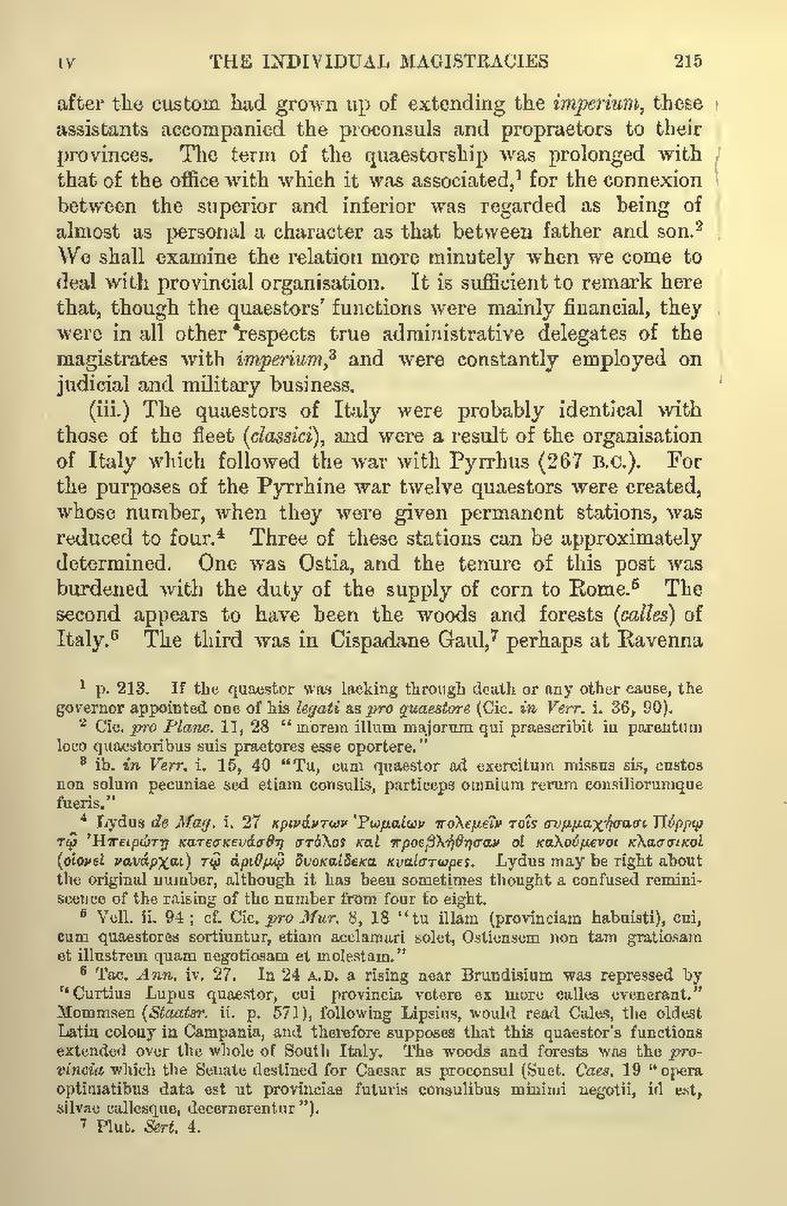after the custom had grown up of extending the imperium, these assistants accompanied the proconsuls and propraetors to their provinces. The term of the quaestorship was prolonged with that of the office with which it was associated,[1] for the connexion between the superior and inferior was regarded as being of almost as personal a character as that between father and son.[2] We shall examine the relation more minutely when we come to deal with provincial organisation. It is sufficient to remark here that, though the quaestors' functions were mainly financial, they were in all other respects true administrative delegates of the magistrates with imperium,[3] and were constantly employed on judicial and military business.
(iii.) The quaestors of Italy were probably identical with those of the fleet (classici), and were a result of the organisation of Italy which followed the war with Pyrrhus (267 B.C.). For the purposes of the Pyrrhine war twelve quaestors were created, whose number, when they were given permanent stations, was reduced to four.[4] Three of these stations can be approximately determined. One was Ostia, and the tenure of this post was burdened with the duty of the supply of corn to Rome.[5] The second appears to have been the woods and forests (calles) of Italy.[6] The third was in Cispadane Gaul,[7] perhaps at Ravenna. Lydus may be right about the original number, although it has been sometimes thought a confused reminiscence of the raising of the number from four to eight.]
- ↑ p. 213. If the quaestor was lacking through death or any other cause, the governor appointed one of his legati as pro quaestore (Cic. in Verr. i. 36, 90).
- ↑ Cic. pro Planc. 11, 28 "morem ilium majorum qui praescribit in parentum loco quaestoribus suis praetores esse oportere."
- ↑ ib. in Verr. i. 15, 40 "Tu, cum quaestor ad exercitum missus sis, custos non solum pecuniae sed etiam consulis, particeps omnium rerum consiliorumque fueris."
- ↑ Lydus de Mag. i. 27 [Greek: krinantôn Rhômaiôn polemein tois summachêsasi Pyrrhô tô Epeirôtê kateskeuasthê stolos kai proeblêthêsan hoi kaloumenoi klassikoi (hoionei nauarchai) tô arithmô duokaideka kuaistôres
- ↑ Vell. ii. 94; cf. Cic. pro Mur. 8, 18 "tu illam (provinciam habuisti), cui, cum quaestores sortiuntur, etiam acclamari solet, Ostiensem non tam gratiosam et illustrem quam negotiosam et molestam."
- ↑ Tac. Ann. iv. 27. In 24 A.D. a rising near Brundisium was repressed by "Curtius Lupus quaestor, cui provincia vetere ex more calles evenerant." Mommsen (Staatsr. ii. p. 571), following Lipsius, would read Cales, the oldest Latin colony in Campania, and therefore supposes that this quaestor's functions extended over the whole of South Italy. The woods and forests was the provincia which the Senate destined for Caesar as proconsul (Suet. Caes. 19 "opera optimatibus data est ut provinciae futuris consulibus minimi negotii, id est, silvae callesque, decernerentur").
- ↑ Plut. Sert. 4.
